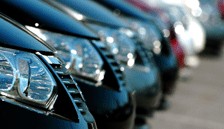By Philip Nothard, CAP retail and consumer valuation editor
The European press has reported that “three in every 10 new vehicles in Germany, including luxury BMWs, are sold not to the customer, but to car- makers and their dealers”.
So how about the UK? What proportion – if any – do pre-reg cars make of the growth this year? Our own research is sensitive in that we are bound by strict confidentiality, so I will report on what we at CAP know, but only in terms which do not breach that trust.
The sense we get is that pre-registrations in the UK are very similar to those recently reported from Germany.
It is clear why manufacturers would wish to gain market share and keep their factories efficient.
What we are interested in is the perception of dealers. They are faced with the crazy situation – as one told me recently – of “hiding behind bushes and continually looking over your shoulder while registering pre-reg cars for customers, so they can benefit from a discount, and we can make some money”.
So why is it a taboo? Everyone, including the customer, is fully aware of the practice. One TV programme recently actively encouraged viewers to take advantage of a pre-registration car to save up to 30% off list price. You only have to look at the newspaper classifieds or online car portals to easily identify them by their discounts.
But they are a secret so we have to dig to discover useful information on the numbers involved. By monitoring the increase in new plate cars advertised for sale with less than 1,000 miles (chart right), the proportion of March 2012 (12/12) cars indicates this year has seen a lot more activity than for the September 2011 (11/61) plate.
Dealers have confidentially confirmed that there has been an increase through 2012 compared to 2011 and the feeling about whether it is good or bad is still very mixed.
One manufacturer bonus approached £500,000 to incentivise one business to put more discounted cars on the road. Another senior business figure told us that an increase posted last month would have been a 6% decrease in volumes sold, without pre-registrations.
But what do dealers think of this?
About 70% of those we asked claimed the only winners are the manufacturers. But – tellingly – the remainder say they could not survive in the current climate without them.
There is quite a complex dynamic at work here, as our research reveals. Some dealers feel almost shamed into taking part because of the ‘hype’ around rising market share elsewhere in their manufacturer’s network.
Another point of interest is that we are not seeing it from some of the big names who used to be responsible for the bulk of pre-reg activity.
The financial incentives involved mean getting in on the act is clearly the only possible commercial choice to make.
But what next? There is strong evidence that one inevitable consequence is eventually the more rapid devaluation of genuine used product. We can illustrate this by a real example. A dealer sold a car with a list price of £23,945, for £19,995 – a discount of just under 20% – the dealer paid £19,000.
The customer had a two-year old car to trade in, for which they gave him £14,000. This gave the customer a balance to pay of only £5,995. The part-exchange is now for sale at £16,000, just £3,995 off a pre-registered ‘new’ car. Can it possibly sustain such a value as a used car?
The dealer is not complaining because he gained two opportunities for profit plus the possibility of some add-on sales.
My opinion is that pre-registration carries risks, but is generally a good mechanism for keeping the wheels of the industry turning, from manufacturer to dealer. It keeps the supplier who depends on the factory busy too.
We should not forget the importance of bringing in good quality part-exchanges and all the opportunities for finance and other add-ons. Aftersales profits are also key to sur-vival in today’s market and pre-reg helps here too. My view is that this is an open secret and there is no purpose served by not reporting accurate and honest statistics. It may be time for everyone to acknowledge reality.















Nobby123 - 28/09/2012 15:42
.